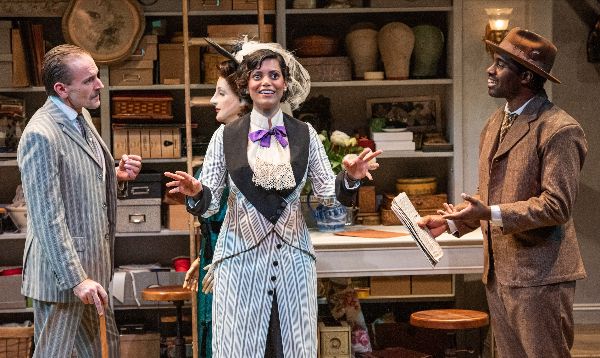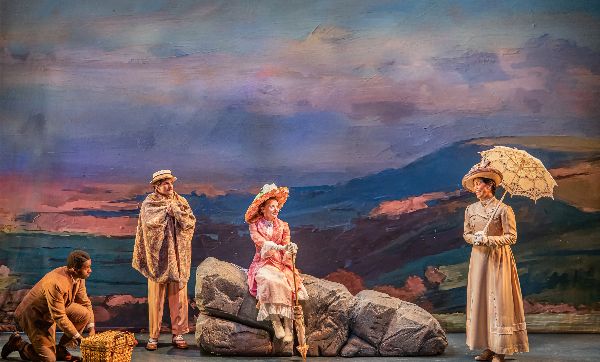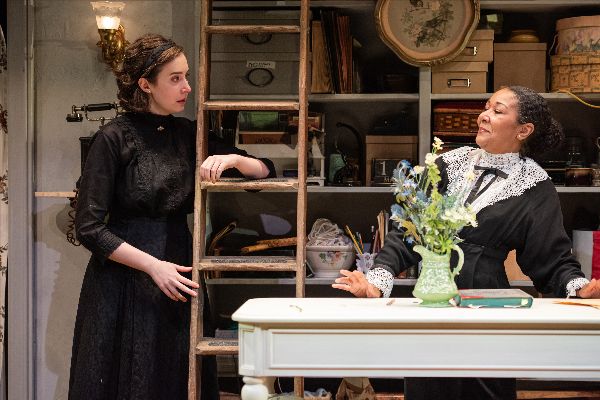
Sara Haider (center) is mesmerizing in Mint production of Elizabeth Baker’s Partnership (Todd Cerveris Photography)
PARTNERSHIP
The Mint Theater at Theatre Row
410 West 42nd St. between Ninth & Tenth Aves.
Tuesday – Sunday through November 12, $39-$79
minttheater.org
www.theatrerow.org
The Mint completes its wonderful “Meet Miss Baker” trilogy with Partnership, another exquisite production of a work by early-twentieth-century playwright and office typist Elizabeth Baker, following 2019’s The Price of Thomas Scott and last year’s Chains. Born in 1876, Baker was a teetotaler raised in a strict, religious lower-middle-class family that was in the drapery business; she didn’t go to the theater until she was nearly thirty and didn’t marry until nearly forty. Her debut, Chains, is a 1909 working-class drama about capitalism and social convention, while Scott, from 1913, also deals with those issues, through a lens involving religion and a family’s clothing store.
A fancy women’s clothing store in Brighton is at the center of Partnership, which explores two types of alliances: business and personal. Kate Rolling (Sara Haider) is a young, single woman who owns a fashionable shop that is poised to make it big. Kate has impressed the fussy and ultrafashionable Lady Smith-Carr-Smith (Christiane Noll), who promises Kate she’ll recommend her shop to “the Duchess,” ensuring a steady, if demanding, stream of wealthy customers.
Kate’s staff gets excited by the possibility, including vivacious salesperson Maisie Glow (Olivia Gilliatt), cynical seamstress Miss Blagg (Gina Daniels), and mousey shop assistant Miss Gladys Tracey (Madeline Seidman), who is engaged to the hapless Jack Webber (Tom Patterson), who is jealous of another of Gladys’s suitors. Jack works for successful haberdasher George Pillatt (Gene Gillette), who has made a surprise appointment with Kate.
“I wonder what Pillatt wants. There’s one thing, I suppose, and that is, he won’t propose,” Kate says to Maisie, who replies, “And he’d be a catch if you like. It’d be better than fighting him, wouldn’t it?”
The space next to Kate’s store has become available, and Pillatt is interested in taking it over — joining forces with Kate, who has been considering leasing the space as well. Pillatt is a dry, grim, darkly serious man with no sense of humor; speaking to Kate privately, he offers, “I have a plan to put before you Miss Rolling, but I will say at the outset that if you don’t care about it, we can drop it and go on as before, without prejudice. It need make no difference, I hope, to our present friendly business relations. If it commends itself to you I shall be very much gratified. Has the idea of a partnership ever entered your head? . . . Your business and mine.”
Kate is flattered by his kind words about her store, but then Pillatt ups the ante in one of the least romantic proposals imaginable: “I want to suggest, to propose a partnership — in another sense, and that is — marriage. Being a plain businessman, I wish to be quite frank in the matter, and so I have not hesitated to put the business part of the plan foremost. I am sure you, as a business woman, thoroughly understand this. . . . I am not a sentimentalist, but then you, a woman of business, do not wish for any expression of sentiment.”
When Kate admits that marriage was not on her radar, Pillatt assures her, in his cold, dispassionate manner, “That part of it will make no more difference than the other.” He then presents her with a formal contract, relating to both the business and the marriage. He is not exactly bursting with love and affection when he tells her, “I have thought it out very carefully. If you can see your way to accept it, I am sure it would work out satisfactorily.”
It’s a phenomenal scene that beautifully develops the characters and sets the stage for what comes next, twisting societal gender conventions and the male-dominated power structure. It takes place in the back private room of Kate’s shop, which features fashion drawings, various materials, shelves of boxes and files, stairs to the upper apartment, and a sharply dressed, realistic-looking mannequin known as Sally that essentially represents how women should be seen and not heard, treated as objects and not free-thinking human beings.
Discussing with Kate and Maisie how all men are fools, Miss Blagg contends, “Dress anything up in a smart blouse and a coiffure and men will make love to it. I’d like to put Sally here just inside the door and see how many of the idiots would come in to have a look at her.”

Lawrence Fawcett (Joshua Echebiri), Elliman (Tom Patterson), Maisie Glow (Olivia Gilliatt), and Kate Rolling (Sara Haider) take a break in the South Downs in Partnership (Todd Cerveris Photography)
When Pillatt’s friend and former classmate, the shy and awkward Lawrence Fawcett (Joshua Echebiri), enters, he is startled by Sally. “Christopher! — I thought she was real,” he calls out. “She’s just ‘it’! I’ve met dozens like her in flesh and blood.” Pillatt, wearing a persnickety, upper-crust striped suit and wielding a cane, and Fawcett, in a plain, unimpressive brown suit and hat, are the same age, but Fawcett looks much younger and has more interest in the outside world. (The stylish costumes are by Kindall Almond, with lighting by M. L. Geiger and sound by Daniel Baker.)
Fawcett has given up his lucrative family corset business to get into dyes, specifically orange. Pillatt has no respect for his decision, telling him, “What fool’s talk is this? You mean, I hope — though I can’t say I follow you quite — that you’re investing money in a dyeing business?”
Kate, in a resplendent cutting-edge fashionable suit and vest with a lacy cravat, purple bowtie, and black buttons and trimmings, is intrigued by Fawcett. When Fawcett, who is on a monthlong vacation, mentions that he is on his way to the South Downs — a national park with diverse landscapes, rich wildlife, spectacular views, unspoiled areas, and small communities — Kate decides that she, Fawcett, Pillatt, and Maisie should have tea on the Downs, and Maisie promises to bring her friend Elliman (Tom Patterson), who has a motorcar.
Up on the Downs — Alexander Woodward’s simplified set for the second act consists of a few rocks in front of a re-creation of James Hart Dyke’s colorful, tranquil 2021 painting, Winter Evening Light on Windmill — Fawcett is in his element, while Pillatt is uncomfortable and perturbed. Kate is intrigued by the freedom Fawcett is experiencing; it’s like he’s a different man in these natural surroundings.
“You are one of the lucky ones who can do as they like,” Kate says, to which Fawcett responds, “Can’t you? I thought you were your own mistress?” The planting of that seed leads to Kate taking another look at her life in the third act.

Miss Gladys Tracey (Madeline Seidman) and Miss Blagg (Gina Daniels) gossip in Elizabeth Baker rediscovery (Todd Cerveris Photography)
Director Jackson Grace Gay (A Little Journey, Transfers) nimbly dances around a gaping plot hole surrounding the question of whether a woman can have it all, success in love and business. Daniels (Becomes a Woman, Network) and Gilliatt (Chains, Mother of the Maid) provide playful humor, Echebiri (Merry Wives) builds charm, Gillette (Pushkin, Orpheus Descending) could not be any more dour, and Tony nominee Noll (Ragtime, God of Carnage) has a ball chewing up the scenery.
But the show belongs to Pakistani singer-songwriter and actress Haider, who is mesmerizing in her off-Broadway debut; you can’t take your eyes off her as Kate, a strong, independent woman, weighs the different parts of her life and must choose which path to follow. We might not always like the choices she makes, but she has every right to follow her heart and mind, wherever they may lead her. Anyone who partners with Kate, or Haider, her has made a wise decision indeed.
[Mark Rifkin is a Brooklyn-born, Manhattan-based writer and editor; you can follow him on Substack here.]